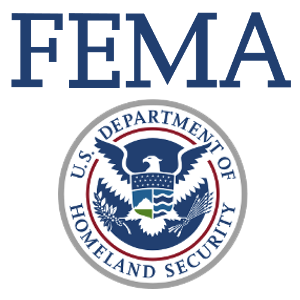Posts Tagged ‘Training’
 General License Class (Black Forest, CO)
General License Class (Black Forest, CO)
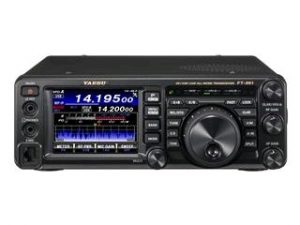 Ham Radio General License
Ham Radio General License
Two-day Class
Black Forest, Colorado
Two class sessions on Sat Sept 24 and Sat Oct 1 (8 AM to 5 PM) FCC Exam session on Oct 8th
Location: Black Forest Fire Station
Intersection of Burgess Rd. & Teachout Rd.
The General License provides access to regional and worldwide communications on the HF bands via ionospheric skip, greatly expanding operational capabilities!
- Upgrade from Technician to General Class radio privileges
- Pass your FCC General Class amateur license exam Oct 8 *
- Live equipment demonstrations and activities
- Learn to operate on the HF bands, 10 Meters to 160 Meters
- Gain a deeper understanding of radio electronics and theory
- Take the next step with antennas, amplifiers, digital modes
Registration fee: $30
(No FCC exam fee required at Oct 8 exam session)
In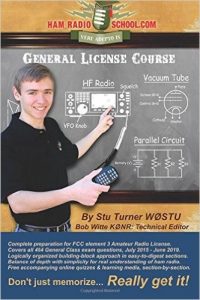 addition, students must have the required study guide:
addition, students must have the required study guide:
HamRadioSchool.com General License Course
Second Edition, effective 2015 – 2019, $22.95
Current FCC Technician License required for registration. Advanced registration is required by Sept 10th or earlier. First-come registration acceptance until class is full.
To register for the class, contact: Bob Witte KØNR
Email: [email protected] or Phone: 719/659-3727
Sponsored by the Tri-Lakes Monument Radio Association.
The post General License Class (Black Forest, CO) appeared first on The KØNR Radio Site.
 Kids are Not the Future of Ham Radio
Kids are Not the Future of Ham Radio
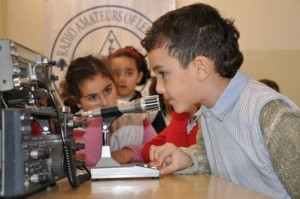 You’ve heard it a million times: our kids are the future. That statement gets applied to almost everything, including amateur radio. How can you argue with an obvious fact like that?
You’ve heard it a million times: our kids are the future. That statement gets applied to almost everything, including amateur radio. How can you argue with an obvious fact like that?
But I am starting to think it is incorrect.
We’ve had really good success on creating new hams of all ages in our Technician License Class (at the Tri-Lakes Monument Radio Association). We’ve been doing this for a while now and I think I am seeing a pattern emerge. We’ve been able to attract middle schoolers to the class and help them get their ham radio license. I’ve talked to many of them on the air. They’ve helped out with public service events. They seem to have fun playing with radios.
Then this thing called high school happens. The high school phase in the US is filled with tons of stuff to do: studying, homework, AP classes, science competitions, sports, dating, movies, driving and after school jobs. Way too much stuff. Ham radio starts to take a backseat to these normal high school activities. Then we don’t see the kids at the radio club meetings or chatting on the local repeater because they are busy doing other things. Have we lost them forever? Not sure.
High school is often followed by college which has its own set of challenges: a totally new environment, away from home, a new set of people, new studies, etc. There might be a ham radio club on campus but maybe not. If a kid is not off to college they are (hopefully) out doing something to establish themselves in this world. Eventually they emerge on the other side, get a job, get themselves established, sometimes with a spouse and maybe a kid or two. By this time they are 25 to 30 years old, depending on the individual.
I recently posted about the demographics of our students in the Tech License Class. The chart below shows the age distribution of our students from our most recent class. Hmmm, clearly most of our students are 30 or older. (Sorry, we have not collected age data with finer resolution.) This particular class is light on the under 18 crowd…sometimes we have a clump of kids in the mix.
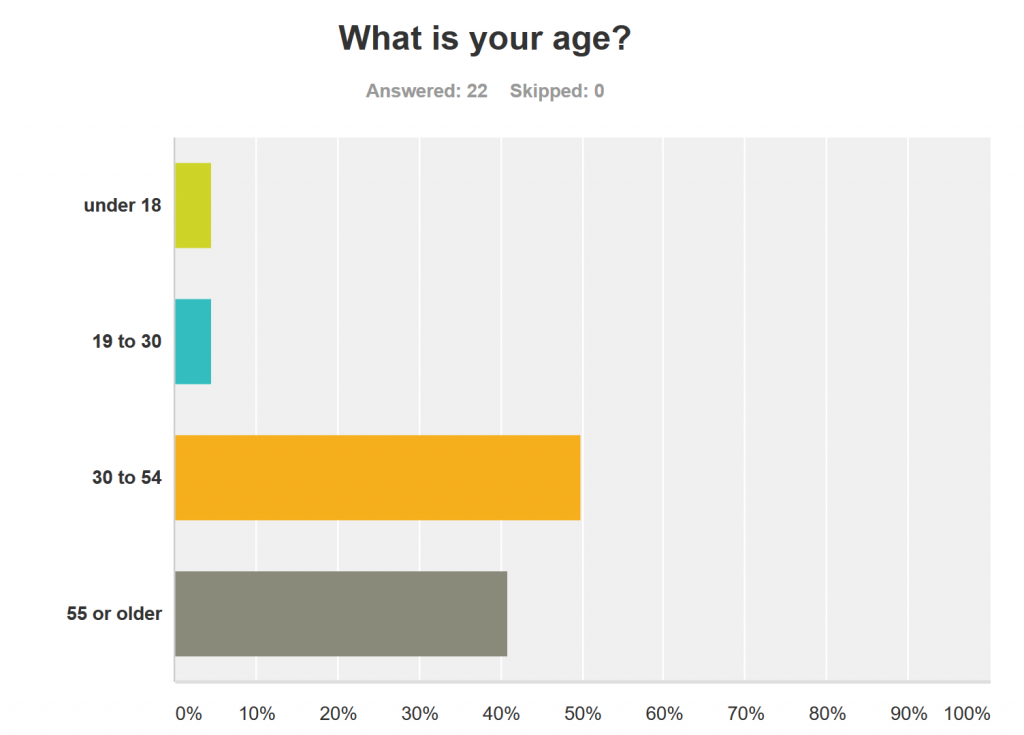 For whatever reason, it seems that most people find themselves in a situation as an adult that causes them to say “I want to get my ham radio license.” When asked why they want to get their ham license, the top response is always emergency/disaster communications, followed by backcountry communications, pursuing electronics as a hobby and learning about radio communications. I suspect that starting to be established in a community and having some disposable income also play a role.
For whatever reason, it seems that most people find themselves in a situation as an adult that causes them to say “I want to get my ham radio license.” When asked why they want to get their ham license, the top response is always emergency/disaster communications, followed by backcountry communications, pursuing electronics as a hobby and learning about radio communications. I suspect that starting to be established in a community and having some disposable income also play a role.
My hypothesis is that the most effective way of growing a vibrant ham radio community is to target adults ages 25 to 40.
This age range is more equipped and ready to be ham radio operators and are still young enough that they will be around for a while. Of course, we still want to work with all age groups, including kids and retirees. We’ve all seen very young hams get the bug for ham radio early and carry it throughout their life. And we also see plenty of older folks get interested in the hobby as they approach or enter retirement. We don’t want to miss out on either of those groups.
So that’s my read on the situation. I’ve got some data to support my theory but I can’t really prove it. What do you think? What are you seeing in your ham radio community?
73, Bob KØNR
The post Kids are Not the Future of Ham Radio appeared first on The KØNR Radio Site.
 Where Are The New Technicians Coming From?
Where Are The New Technicians Coming From?
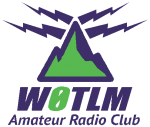 We just wrapped up our Technician license class sponsored by the Tri-Lakes Monument Radio Association. Thirty people took the Technician exam with 27 passing (90%). Four people went on to pass the General exam.
We just wrapped up our Technician license class sponsored by the Tri-Lakes Monument Radio Association. Thirty people took the Technician exam with 27 passing (90%). Four people went on to pass the General exam.
We offer the class twice per year and it always fills to capacity. Invariably, we wonder “where are these new hams coming from?” and instituted a survey to try to find out. Here’s the data from the most recent class, which is typical of previous classes.
Demographics
The class was almost all male (90%) and mostly above the age of 30. From time to time, we’ve had groups of Boy Scouts come through the class which shifts the age profile a bit lower.
 We ask about how they found out about the class. These responses overlap so we have them check all that apply. Most of these people find out about the class through normal “ham radio channels”, including the ARRL web site. A few people in the “other” category mentioned notices published in local weekly newspapers.
We ask about how they found out about the class. These responses overlap so we have them check all that apply. Most of these people find out about the class through normal “ham radio channels”, including the ARRL web site. A few people in the “other” category mentioned notices published in local weekly newspapers.
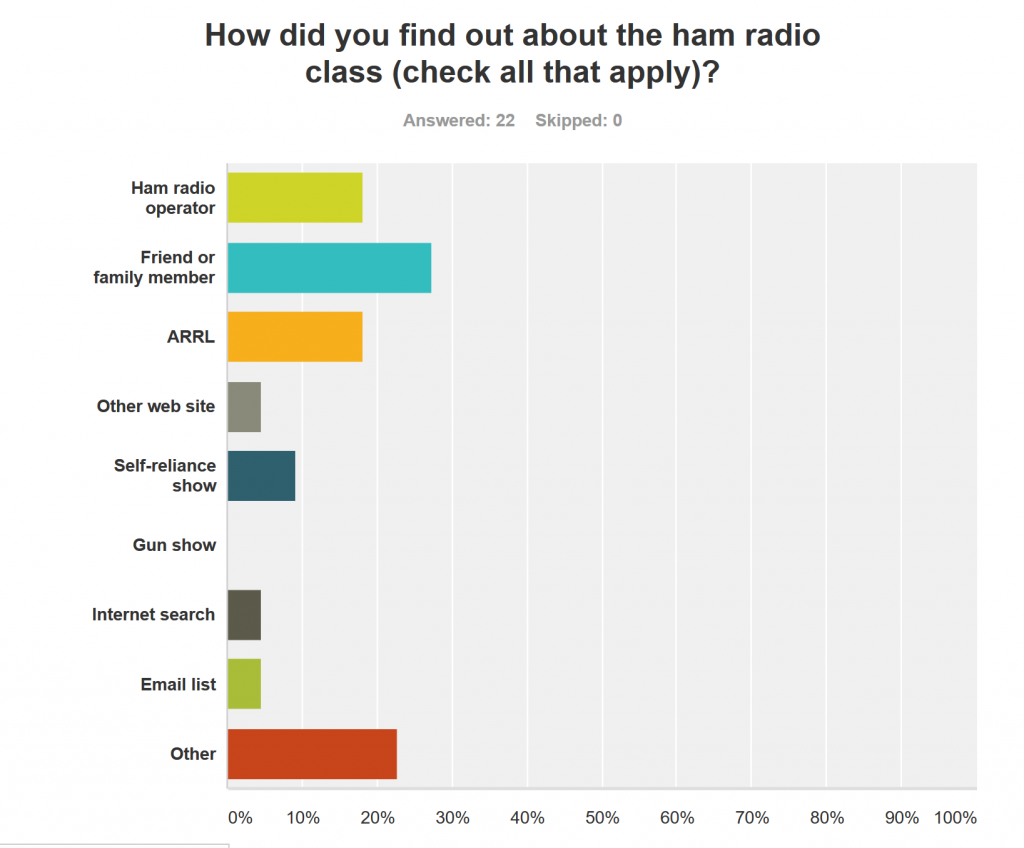 Here’s where it gets interesting. Why do they want to get their amateur radio license? Disaster and emergency communications continues to be the most common answer at almost 90%. This is followed by the closely-related Backcountry/Remote Communications (about 80%). About 60% of the respondents selected radio and electronics as a hobby. More than half said they want to learn about radio communications.
Here’s where it gets interesting. Why do they want to get their amateur radio license? Disaster and emergency communications continues to be the most common answer at almost 90%. This is followed by the closely-related Backcountry/Remote Communications (about 80%). About 60% of the respondents selected radio and electronics as a hobby. More than half said they want to learn about radio communications.
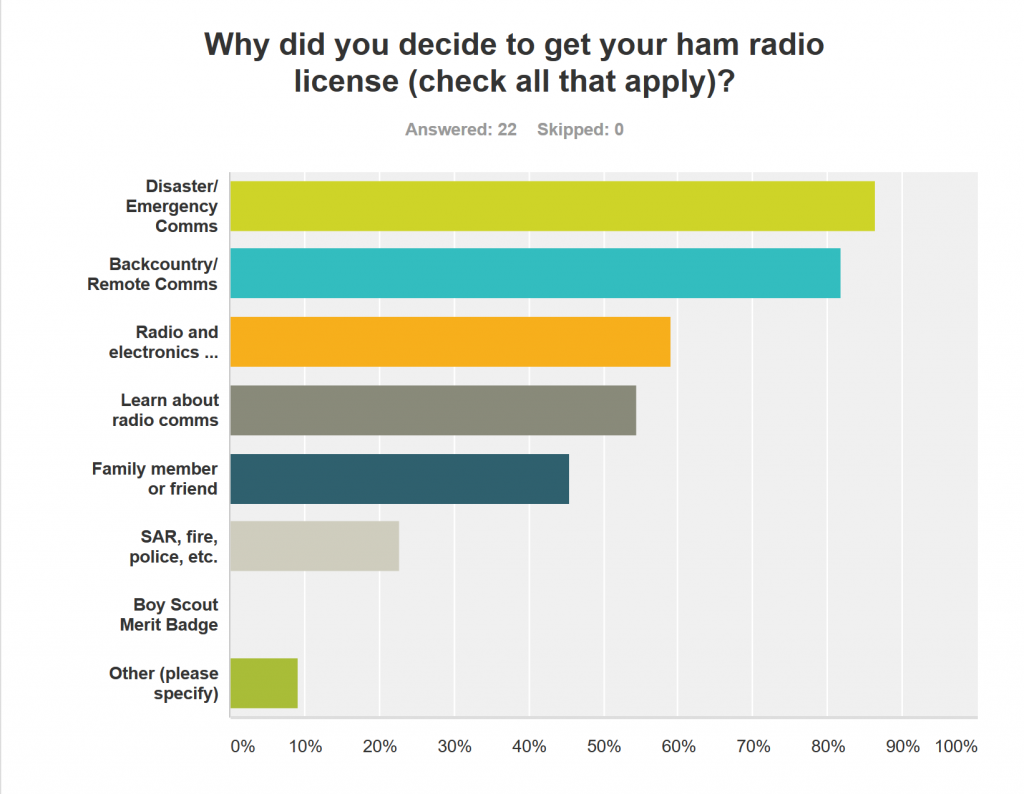 Not to be overlooked is the influence of family and friends at 45%. We often see family members of current radio hams that were
Not to be overlooked is the influence of family and friends at 45%. We often see family members of current radio hams that were badgered encouraged to get their radio license. We do see more than 20% that see a ham radio benefit to their involvement with fire, search and rescue, law enforcement and similar agencies.
Summary
Emergency and disaster preparedness rank high in the reasons why these people are interested in amateur radio. This may be fueled locally due to the recent devastating wildfires in Colorado. Many people experienced first hand what happens to the mobile phone and landline systems when disaster strikes. When All Else Fails. The other major motivation is the traditional hobby aspect of amateur radio. People like to learn about technology and have fun experimenting with it. Lately, this has taken the form of the Maker Movement.
73, Bob K0NR
The post Where Are The New Technicians Coming From? appeared first on The KØNR Radio Site.
 You’ve Got Questions, We’ve Got Answers
You’ve Got Questions, We’ve Got Answers
 K3NG has performed an important public service by tabulating the answers to the top ten amateur radio questions swirling about the interwebz. This will save thousands of hours for hams searching for this critical information.
K3NG has performed an important public service by tabulating the answers to the top ten amateur radio questions swirling about the interwebz. This will save thousands of hours for hams searching for this critical information.
Unfortunately, he did not include the questions, so you will have to use your imagination on that. But its not difficult.
73, Bob K0NR
The post You’ve Got Questions, We’ve Got Answers appeared first on The KØNR Radio Site.
 The 10 Essentials for Hiking (and SOTA Activations)
The 10 Essentials for Hiking (and SOTA Activations)
 Most backcountry hikers are familiar with the Ten Essentials that you should take with you whenever you head into the wilderness. Over the past few years, I noticed that I was getting a bit sloppy with regard to what is actually in my pack when I head out on the trail. This hit home one day when my GPS battery went dead. I fumbled around to find my compass which was supposed to be in my pack. Well, it was in my pack, the other one that I left at home.
Most backcountry hikers are familiar with the Ten Essentials that you should take with you whenever you head into the wilderness. Over the past few years, I noticed that I was getting a bit sloppy with regard to what is actually in my pack when I head out on the trail. This hit home one day when my GPS battery went dead. I fumbled around to find my compass which was supposed to be in my pack. Well, it was in my pack, the other one that I left at home.
This caused me to review the list of ten essentials to make sure I had the right stuff in my kit. A search on the internet revealed that the classic list of ten has been modified and augmented by various people to make it better. (Innovation runs rampant on the interwebz, you know.) One of the better resources I found was this page on the REI web site, which explains how the Classic Ten Essentials have been updated to the Ten Essential Systems:
- Navigation (map and compass)
- Sun protection (sunglasses and sunscreen)
- Insulation (extra clothing)
- Illumination (headlamp/flashlight)
- First-aid supplies
- Fire (waterproof matches/lighter/candles)
- Repair kit and tools
- Nutrition (extra food)
- Hydration (extra water)
- Emergency shelter
Read through the REI web page to get the fine points of this system approach. I won’t repeat that information here. They also include a Beyond the Top Ten list which calls out the need for:
Communication device: Two-way radios, a cell phone or a satellite telephone can add a measure of safety in many situations.
Of course, what they really mean is an amateur radio transceiver and antenna but they probably can’t say that in print due to licensing issues. (Not everyone in the backcountry has an FCC ham license. I know, they all should have an amateur license but many don’t…very hard to understand.)
So how are you doing with your Ten Essentials list? Are you consistent in taking along the right stuff in your pack? Any tips to share with hiking hams?
73, Bob K0NR
The post The 10 Essentials for Hiking (and SOTA Activations) appeared first on The KØNR Radio Site.
 Long night
Long night
Description:
This class is designed for those auxiliary emergency communicators and groups who volunteer to provide backup emergency radio communications support to public safety agencies. Typically, this includes amateur radio and Radio Emergency Associated Communications Team (REACT) communicators, but may include other volunteer emergency communicators.
Volunteer emergency communications operators/groups, using amateur radio, have been providing backup communications to public safety for nearly 100 years. Event planners, public safety officials, and emergency managers at all levels of government utilize their services. Often, amateur radio services have been used when other forms of communications have failed or have been disrupted. Today, nearly all the states/territories have incorporated some level of participation by amateur radio auxiliary communication operators into their TICPs and SCIPs.
This course focuses on auxiliary communications interoperability, the relationship between the COML and the volunteer, emergency operations center (EOC) etiquette, on-the-air etiquette, FCC rules and regulations, auxiliary communications training and planning, and emergency communications deployment. It is intended to supplement and standardize an operator’s experience and knowledge of emergency amateur radio communications in a public safety context.
It's a two day event, held over the weekend of October 24th and 25th at the Middlesex County Fire Academy. Looks to be interesting. My registration was received and accepted pending my sending in the certificates of completion, which I sent in this morning.
The FEMA courses were comprehensive in scope. Each was designed to be completed in about 3 hours and I came in slightly under that amount of time - maybe two and a half hours or two hours and forty five minutes each.
I crammed two in last night (which wasn't wise) as each evening for the rest of this week is booked with other activities. I was pretty bleary eyed for that last exam, but was pleased when I got the e-mail that I passed.
FEMA offers a lot of free, on-line independent study courses. You can look them up at https://training.fema.gov/is/crslist.aspx?all=true
72 de Larry W2LJ
QRP - When you care to send the very least!
 Announcing: Oct 2015 WØTLM Technician License Class
Announcing: Oct 2015 WØTLM Technician License Class
 Ham Radio Two-Day License Class
Ham Radio Two-Day License Class
Sat Oct 3 and Sat Oct 10 (8 AM to 5 PM) 2015
Location: Black Forest Fire Station 1, Black Forest, CO
The Technician license is your gateway to the world-wide excitement of Amateur Radio …
- Earn your ham radio Technician class radio privileges
- Pass your FCC amateur radio license exam right in class on the second day
- Multiple-choice exam, No Morse Code Required
- Live equipment demonstrations
- Learn to operate on the ham bands, 10 Meters and higher
- Learn to use the many VHF/UHF FM repeaters in Colorado
- Find out how to participate in emergency communications
There is a non-refundable $25 registration fee for the class.
In addition, students must have the required study guide and read it before attending the two-day class: HamRadioSchool.com Technician License Course $20.95
(make sure you get the most recent edition of this book, updated for the new FCC exam questions)
Advance registration is required (no later than one week before the first session, earlier is better! This class usually fills up weeks in advance.)
To register for the class, contact: Bob Witte KØNR
Email: [email protected] or Phone: 719 659-3727
Sponsored by the Tri-Lakes Monument Radio Association
For more information on amateur (ham) radio visit www.arrl.org
The post Announcing: Oct 2015 WØTLM Technician License Class appeared first on The KØNR Radio Site.
